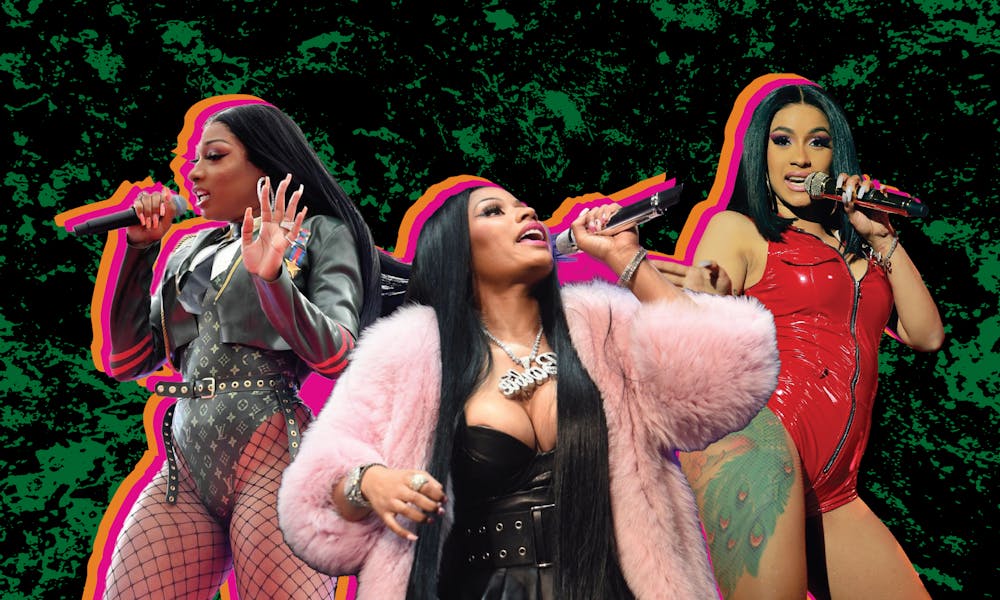In early May, Nicki Minaj's remix of Doja Cat's "Say So" peaked at number one on the Billboard Hot 100 chart—the first song by two female rappers ever to do so. This triumph was made even sweeter by the fact that Beyonce's remix of Megan Thee Stallion's Savage had secured the number two spot. Four Black women had outsold every other artist in the country that week. There is no more significant proof that we are currently watching some sort of hip–hop renaissance unfold.
In 2017, Street posed the question "Where are The Women of Hip–Hop?" but in 2020 you would have to be living under a rock not to be aware of the massive waves that women have been creating in the industry over the last few years. From TikTok to festival lineups, female rappers are everywhere. Like the rest of the music industry, hip–hop used to be a man's world with room for only a few female rappers at a time (we all remember the Cardi vs Nicki saga in 2018). But in 2020, the women of rap are no longer sitting idly by waiting for their chance to be recognized. During the early 2000's you could count the number of notable female rappers on the one hand. But, now you can find multiple playlists on streaming services such as Spotify filled with enough songs to listen to female rappers exclusively.
The song of the summer undoubtedly has to be "WAP", the latest collaboration by Megan Thee Stallion and Cardi B. "WAP" explores female sexuality, something which is usually taboo in mainstream media and does so in a sex–positive way. Men in the rap industry have long degraded women and demanded that they perform sexual acts on them in their lyrics, but "WAP" flips the switch on this. Whenever sexual references are made to their bodies, it's in the control of the woman, not the man. Moreover, Megan Thee Stallion and Cardi B prioritize female pleasure over the male ego and in a world where women have been conditioned to be submissive for decades, it's an undeniably powerful message.
However, nothing is so entirely straightforward. Many Republican politicians, despite an impending election, took to Twitter to express their disdain for the song. Former Congressional candidate DeAnna Lorraine tweeted "Cardi B & Megan Thee Stallion just set the entire female gender back by 100 years with their disgusting & vile "WAP" song." James P Bradley, who is running for a Congressional seat in California, also chimed in saying "Cardi B & Megan Thee Stallion are what happens when children are raised without God and without a strong father figure. Their new "song" The #WAP (which i heard accidentally) made me want to pour holy water in my ears and I feel sorry for future girls if this is their role model!". Although the popularity of female rappers has skyrocketed recently, this kind of criticism is far from new.
In fact, similar criticism can be found in Penn's very own Statesman, who had a lot to say about the popular rapper CupcakKe performing at the 2018 Spring Fling celebration. CupcakKe is part of this new generation of female rappers taking the industry by storm with their expression of unapologetic female sexuality. With songs such as "Vagina" and "Deepthroat", it would seem unconventional to label CupcakKe as a feminist icon. But with her being so in charge of her own sexuality and inviting her fans to do the same, well, how could she not be? Other sex–positive female rappers include Khia, whose "My Neck, My Back (Lick It)" is infamous. It would be easy to write this song off as a dirty song about oral sex, but the question is whether Khia is being written off for the song's content, or simply because she's a woman. When the song came out in 2002, it was ripped to shred by critics, but Khia's male counterparts were able to release albums about female degradation—such as Snoop Dogg's "Lollipop"—and even jokes about rape with little to no rebuttal. The song depicts the rare image of a woman who is sexual without trying to hide it or attain sexuality through pleasing a man and instead demands that she be pleased as well. With her lyrics, Khia fights for sexual equality in the bedroom, an issue which has notoriously been silently ignored.
But critics are not loud enough to silence female rappers. "WAP" is a perfect example of this. It garnered a massive 26.5 million views in its first day on YouTube and topped charts all over the globe and even broke the first–day streaming records for both female rap songs and all–female collaborations.







